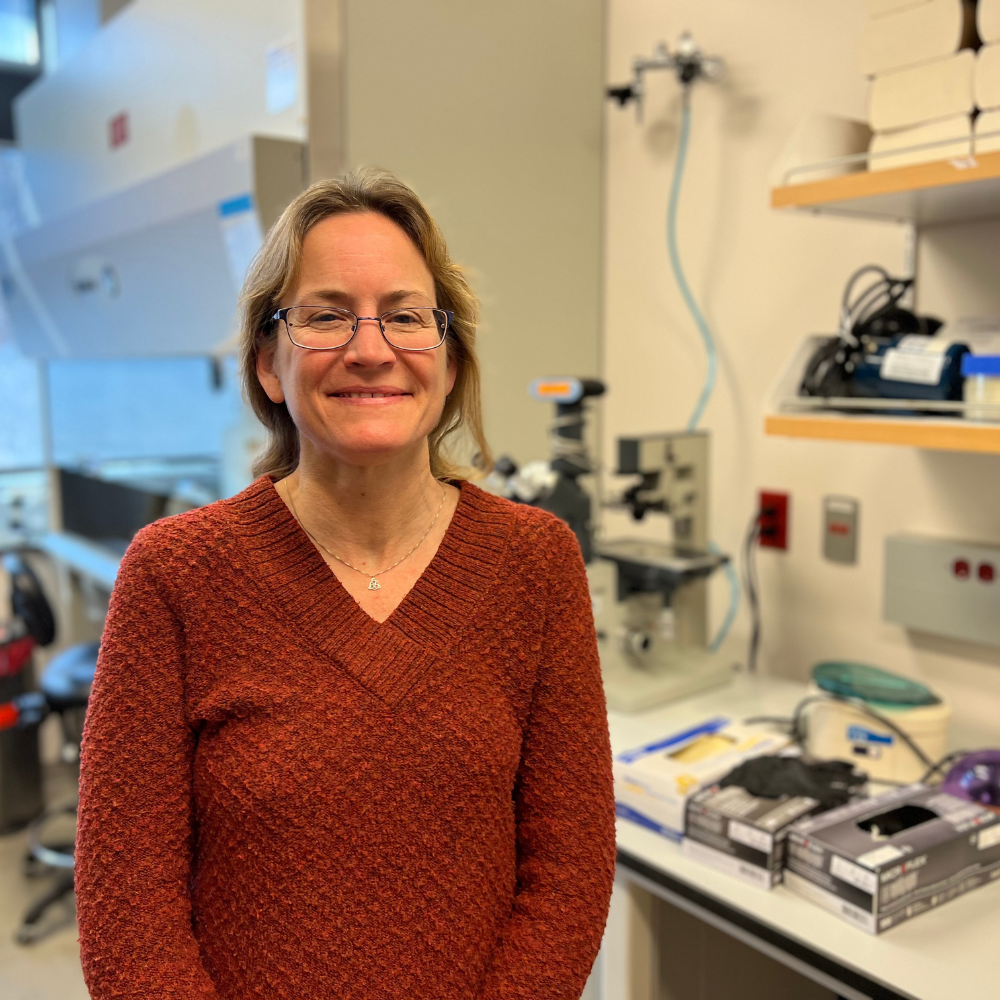
Dr. Amy L. MacNeill, DVM, PhD, DACVP
Pathology/Immuno Pathology Lab
During my first year of veterinary school, I knew I wanted to be a researcher. I feel really fortunate that my career has allowed me to pursue my dreams and study new cancer treatments.
I was raised in New Hampshire, and I always loved science when I was in school. Growing up, we had an array of cats and dogs in our home. Veterinary medicine was the perfect blend of my love for animals and my interest in science.
The strong veterinary program pulled me to Florida after high school. I graduated from the University of Florida with a B.S. in chemistry in 1994 and then a doctorate in veterinary medicine in 1998. Following a year in private practice, in New Hampshire, I realized I really did want to work in the field of research as I had thought early in vet school. I returned to the University of Florida to complete a PhD and a residency in veterinary clinical pathology.
In 2005, I joined the faculty at the University of Illinois as an assistant professor in the Department of Pathobiology and the Veterinary Diagnostic Laboratory. The strong clinical trials program at Colorado State University led me to accept a clinical pathology faculty position in the MIP department. I’m also a researcher on the Flint Animal Cancer Center team.
I now split my time in three ways – teaching, research, and clinical work. I love that my job allows me to wear many different hats and no two days are ever exactly the same.
I coordinate the Microbiology, Immunology, and Pathology Department Combined Residency Program, and teach immunology and pathology to vet students. It is a joy to inspire future veterinarians and researchers.
I also serve as a clinical veterinary pathologist. I spend about a third of my time looking at pet samples to diagnose diseases through cytology and hematology interpretation. I work with residents and vet students to help them understand the results and make informed treatment decisions based on our findings.
The third hat I wear is in the lab. In our lab, we’re targeting tumor types that do not yet have effective treatment options, specifically high-grade sarcomas.
When a patient undergoes surgery or radiation for this cancer, there are often microscopic cancer cells left behind. These will soon regrow and/or metastasize to other areas of the body, often worsening in severity. In order to prevent or slow this dangerous trend, we are creating oncologic viruses that can help us kill cancer cells.
Oncologic viruses are either genetically engineered or naturally existing viruses that we’ve tested in cancer samples in the lab. These viruses are injected into the tumor; they replicate in cancer cells and then the virus kills the cancer cell without damaging the healthy cells around the tumor. Simultaneously, they activate the immune system to help attack the cancer cells. It’s fascinating that we can hijack viruses and use them to our advantage.
This work is at the forefront of cancer treatments and we’ve seen promising results. We know oncologic viruses are safe and they have the potential to reduce recurrence. We just patented our first oncologic virus and we plan to partner with private enterprises to bring it to market.
The hope is that these viruses, paired with traditional cancer treatments – surgery, medicine, and radiation – can really move the needle in veterinary oncology care and maybe even human oncology in the future.
I’m passionate about this work because innovative therapies such as this are going to be the cancer treatments of the future. The best part of my job is interacting with other students, faculty, and researchers who are all working equally hard to understand and treat cancer.
When I’m not working, I love to spend time outside with my horses. I also like to hike and listen to live music. I have two horses, two dogs, and two cats. My horses are Vina and Pretty Boy. The dogs are named Buddy and Ruby, and the cats are Knuckles and Ringer.
I recently lost my nine-year-old German shepherd dog, Jett, to cancer. I know how painful it is to lose a best friend and I work hard every day to find ways to improve cancer outcomes for all patients.